#Somme Offensive
Text


LOOK WITHIN THESE EYES OF MADNESS AND DESPAIR -- "WAR IS A BLACK HOLE TO AVOID."
PIC(S) INFO: Spotlight on a shell shocked Allied soldier in a trench during the Battle of Flers-Courcelette during the Somme Offensive, c. September 1916.
PIC #2: The original photograph. Medical orderlies tend to the wounded in a trench during the Battle of Flers-Courcelette in mid-September 1916. The man on the left is suffering from Shell Shock. Photographer unknown.
OVERVIEW: "His eyes express the madness of the war. The soldier looks like he has gone insane from what he has seen. In that moment in time everything he’s been raised to work within, the social constructs which make up every part of his life just exploded and shattered to nothing, and he’s lying there, slumped in a trench, afraid for his life, hearing and seeing death around him, his entire psyche broken. Even more haunting when you think that people didn’t smile for the pictures back then.
PART II: The circumstances of the First World War pushed hundreds of thousands of men beyond the limits of human endurance. They faced weapons that denied any chance for heroism or courage or even military skill because the artillery weapons that caused 60 percent of all casualties were miles away from the battlefield.
PART III: The term “shell shock” was coined by the soldiers themselves. Symptoms included fatigue, tremor, confusion, nightmares and impaired sight and hearing, an inability to reason, hysterical paralysis, a dazed thousand-yard stare is also typical. It was often diagnosed when a soldier was unable to function and no obvious cause could be identified. "Simply put, after even the most obedient soldier had enough shells rain down on him, without any means of fighting back, he often lost all self-control.""
-- RARE HISTORICAL PHOTOS
Source: https://rarehistoricalphotos.com/shell-shocked-soldier-1916.
#Shell shock#World War I#World War 1#First World War#Somme Offensive 1916#The Great War#Somme Offensive#WWI#Photography#1910s#Somme#PTSD#Battle of Flers-Courcelette 1916#Insanity#WW1#Battle of Flers-Courcelette#1916#War photography#Realities of War#Western Front#Great War#British Army#War Neurosis#War is Insanity#France#Anglo-French#World War One#Europe
0 notes
Text

German T-Gewehr anti-tank rifle team of Infanterie-Regiment Nr. 124 of 27 Württemberg Infanterie-Division, France, late summer-autumn 1918. Accessioned as Q 44794 in the collections of the Imperial War Museum
#anti-tank rifle#t-gewehr#trench warfare#bray-sur-somme#world war 1#hundred days offensive#end of world war 1#deutsches kaiserreich#imperial germany#deutsches heer
3 notes
·
View notes
Text

Painting depicting a Canadian 6-inch howitzer supports British troops in the attack on Thiepval on 16 July 1916 during the Somme offensive. The artist captures the exhaustion of the gunners, who appear to have been firing for hours. Prolonged exposure to the noise and shock artillery fire would rupture eardrums and ruin hearing. Most gunners suffered at least partial deafness as a result of their war service.
#historical photos#world war 1#history#1917#canadian history#Canada#world war 1 stories#ww1#ww1 poetry#ww1 stories#ww1 art#ww1 history#wwi#world war one#The Great War#The First World War
109 notes
·
View notes
Text
As the name suggests, the World Wars involved the world. People from all over served, and this includes people from African and Carribbean countries, yet I feel they are not so well-remembered in media and the history books for their heroics and sacrifices. Here are a few icons among many below.
Eugene Bullard

Eugene Jacques Bullard (1895-1961) was one of the first black American pilots and served in the French air force’s Lafayette Flying Corps, an all-American volunteer outfit, in World War 1. Meanwhile, in World War 2, Eugene Bullard served as a spy for France, where he also proved highly successful against the Nazi regime. Bullard was fluent in English, German and French, as well as a boxer and self-taught Jazz musician.
Eugene Bullard was awarded fifteen French war medals: Knight of the Légion d’honneur, Médaille Militaire, Croix de Guerre, Volunteer’s Cross (Croix du combattant volontaire), Wounded Insignia, World War I Commemorative Medal, World War I Victory Medal, Freedom Medal, and the World War II Commemorative Medal.
Walter Tull

Lieutenant Walter Tull (1888 - 1918) was the first British-born black army officer and the first black officer to lead white British troops into battle. He fought on the Somme in 1916 and became the first black combat officer in the British army in spite of a military rule officially excluding "any negro or person of colour” from that position. Before the War, he was a pioneering black football player and the first black outfield player to feature in the English top flight, with two seasons at Tottenham Hotspur.
Sadly, Walter Tull was killed in 1918, during the early German spring offensive, and was never awarded the military cross that he was recommended for.
Johnny Smythe

Born in Sierra Leone, Johnny Smythe (1915 - 1996) successfully made it into RAF aircrew during the Second World War. Smythe trained as a navigator, having a great talent for mathematics. He successfully navigated 26 bombing missions over Germany, although was unfortunately shot down on his 27th mission and captured. Smythe would spent the last two years of the war in Stalag Luft I, an infamous Lufftwaffe-run POW camp, until he was liberated by the Russians in 1945.
In 1948, Johnny Smythe served as the senior officer aboard the Windrush. After pursuing a career in law and working as the Queen's Counsel for Sierra Leone for a number of years, in 1961 he was appointed Solicitor General of the newly independent Republic of Sierra Leone. In 1978, he awarded the Order of the British Empire (OBE) for his outstanding service.
Ulric Cross
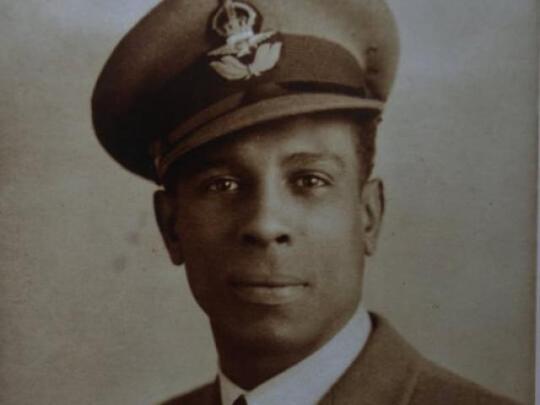
Ulric Cross (1917 - 2013) was Trinidadian and one of the most decorated Caribbean airmen in WWII. Joining the RAF at 24, he trained as a navigator and joined 139 Squadron, gaining the nickname ‘The Black Hornet’. Cross was an expert in precision bombing and later joined the ranks of the elite Pathfinder Force, flying high-risk missions into enemy territory as low as 50 feet as opposed to 25,000 like most pilots. While Cross was offered the option to rest after completing 50 missions, he instead volunteered for another 30 missions over enemy territory. At the end of the War, Cross had flown a total of 80 missions.
For his undeniable commitment, hard work and skill, Cross was awarded the Distinguished Flying Cross and the Distinguished Service Order.
#world war 2#world war 1#us history#uk history#africa#sierra leone#trinidad#black soldiers#world war means WORLD War#someone write a movie about these guys and many others#history#black history#caribbean
160 notes
·
View notes
Text

Indian cavalry of the 20th Deccan Horse in the Carnoy Valley shortly before their unsuccessful attack at High Wood during the Somme offensive, 14 July 1916
69 notes
·
View notes
Text

Clearing of Captured Trenches
The complete clearing up of captured trenches in which there are deep dug-outs requires a considerable amount of careful arrangement. The following method is suggested:-
A party of men should go forward with each of the leading lines. The men with the first line should remain in the front trench captured. The men with the second line should remain in the second trench captured and so on.
These men should act as ‘Caretakers’ to the trench until the arrival of the proper clearing up party.
They should all be supplied with P[hosphorous] bombs, which they would thrown down into all dug-outs in their portions of the trench. It is believed that the 7th Division used these P bombs with great effect, as they set fire to the dug-outs and the occupants were burnt alive, asphyxiated or forced to come out.
The ‘Caretakers’ should take no prisoners. The reason for this is that should the enemy’s barrage prevent our supporting lines following up the leading lines, captured Germans might be able to empower their guards and then shoot our leading men in the back.
They actually did this more than once e.g. La Maisonnette, where a whole position was recaptured by the prisoners.
Larger parties should advance with the supporting lines and carry out a systematic clearing up of captured trenches.
17/9/16 – II Corps – G. 339. Miscellaneous Notes gathered from Divisions who have taken part in recent offensive operations.
A British No 26 white phosphorous grenade, or P Bomb. Literally just a tin can filled with white phosphorous and intended to produce a smoke cover. Troops also found them very useful for clearing German bunkers.

Headquarters of all units and formations had the responsibility to collect reports and analyse them for lessons that could be learnt from each of the operations they undertook. Every so often documents such as this, compiled from subordinate units, would be disseminated by corps or army headquarters. They're not really official doctrine or rules to be followed, but points for discussion and analysis by commanders. This one covers the first couple of months of the Battle of the Somme.
One of the key issues new units ran into was not "mopping up" positions they'd just captured and a lot of effort was put into remedying this after 1916.
102 notes
·
View notes
Text
When Russia invaded Ukraine, Americans overwhelmingly supported Ukraine—as they did with Israel after October 7.
No wonder: Ukraine was surprise attacked by Russia, and Israel was by Hamas.
It seemed an easy binary of good versus evil: both the attacked Ukraine and Israel are pro-Western. Both their attackers, anti-Western Russia and Hamas, are not.
Now everything is bifurcating. And the politics of the wars in America reflect incoherence.
Both Ukraine and Israel are portrayed in the media as supposedly bogging down in their counteroffensives.
More pro-Israel Republicans are troubled by Ukraine’s strategy, or lack thereof, in an increasing Somme-like stalemate.
Yet more pro-Ukrainian Democrats are turning away from Israel as it dismantles Gaza in the messy, bloody slog against Hamas. The left claims either Israel cannot or should not defeat Hamas, or at least at the present cost.
So the left pushes Israel to a ceasefire with Hamas.
It blasts Israeli “disproportionate” responses.
It demands that Israel avoid collateral damage.
It pressures it to form a wartime bipartisan government.
It lobbies to cut it off from American resupply.
It is terrified that Israel will expand the war by responding to aggression from Hezbollah and Iran.
Yet on Ukraine, the left oddly pivots to the very opposite agenda.
It believes Ukraine should not be forced to make peace with Russian “fascists.” It must become disproportionate to “win” the war.
President Zelensky deserves a pass, despite cancelling elections while suspending political parties.
America must step up its resupply to Kyiv with more and far deadlier weapons.
Ukraine has a perfect right to hit targets inside Russia.
Russian threats to widen the war should be considered empty and thus ignored. America should hate Russia far more than Hamas.
By contrast, conservatives are less supportive of Ukraine’s offensives, if more than ever allied with Israel.
In their realist views, Ukraine is a smaller power, vastly outnumbered by a richer, better-armed Russia. Thus, it should negotiate while it can, rather than eventually losing everything.
Israel, however, is, in their view, defeating Hamas. If allowed to finish the job, it can soon win the war in Gaza and still handle Hezbollah and deter Iran.
Furthermore, the right is wary that Russia is a nuclear power. The Ukraine war is unfortunately creating a new, potent anti-American axis of Russia, China, Iran, and North Korea and drawing in former U.S. allies like Turkey and Qatar.
Yet, in Israel’s case, the U.S. is far more powerful than Hamas’s patron, Iran, and can easily deter it should Tehran intervene.
As of now, none of Hamas’s allies have nuclear weapons. Israel, however, does, unlike Ukraine.
Many conservatives further point out that Israel is a long-time U.S. democratic ally.
Ukraine’s elections are currently suspended while the country remains under martial law.
In realist terms, the old idea of Russian triangulation still makes some sense. Russia should be no friendlier to China than to the U.S., and China is no more aligned with Russia than with America.
Hamas, by contrast, is a terrorist clique, as are Hezbollah and all of Iran’s terrorist appendages. Their hatred of the U.S. is long-standing, immutable, and transcends the Gaza war.
How about the public’s views in general?
With over $35 trillion in debt, still smarting over the humiliating withdrawal from Kabul, and the military short 40,000 recruits, the public does not wish to get heavily involved in either war, even as polls still show radically differing left/right attitudes toward both.
Americans once overwhelmingly supported vast aid for Ukraine. Now they decidedly believe the U.S. is providing too much to Kyiv.
They still poll strong support for Israel over Hamas, but less so for Israel’s ongoing destruction of Hamas given the collateral damage that follows.
Given there are few Russian-Americans, there are almost no demonstrations on behalf of Moscow’s war. But there are plenty of protests for Hamas since there are lots of Middle-Eastern Americans and visitors within the U.S.
What are we to conclude about these contradictory wars and American attitudes toward them?
The more democratic and defensive the power, the more Americans support it—but only up to a point.
Even more, they demand quick victory—and lose interest when the wars stagnate, costs increase, and protests grow.
When Ukraine and Israel began costly counteroffensives, the former losing thousands and the latter killing thousands, the American public began to be less invested in either war.
Final lessons?
Israel should do all it can to destroy Hamas as quickly as possible and end the war.
Ukraine does not have the wherewithal to defeat Russia. It should cease costly offensives against Russia’s fortified lines and seek to negotiate.
Or, put another way, fickle Americans sympathize with those who are attacked. But their continuing support seems contingent on whether the victim can remain sympathetic—and win decisively to end the war rapidly.
5 notes
·
View notes
Text
Werner Voss - Part 1
Werner Voss - one of the fan favorites. Regrettably, at the age of 20, his life was already over, but he went out with a bang.
This article serves to give an overview of his life and remember an exceptional human who, like so many others, was caught up in a situation he had no control over and paid for it with his life.
Werner Voss was born on 13 April 1897 in Krefeld, German Empire. He came from an affluent family, his father owning a cloth dying business.
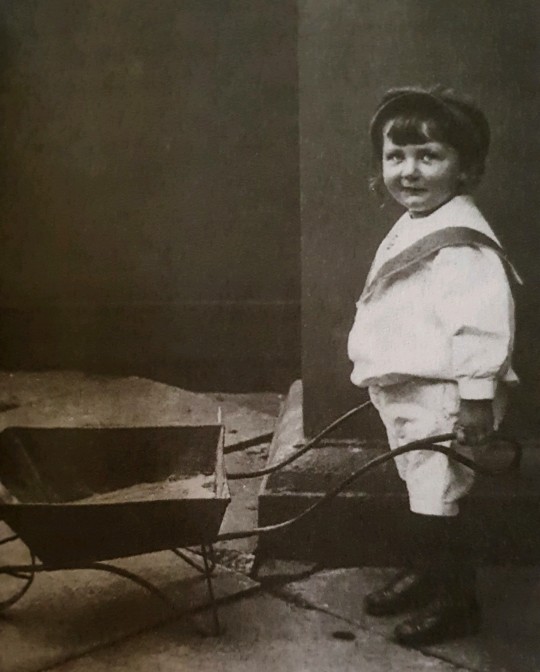
Voss had two brothers and for a long time it was thought he also had two sisters. As it turned out, however, the two girls who often appear in family pictures and are rumored to have charmed Manfred von Richthofen were Voss's cousins.
In early 1914, with tensions already running high across Europe, Voss joined the Ersatz Eskadron 2 of the Westfälische Husaren-Regiment Nr. 11. When the Great War broke out a few months later, Voss was just 17 years old but immediately joined active service in November 1914. Hussars are cavalrymen, but the use of cavalry soon died out as the war shifted towards the trench warfare we all are familiar with.
Young Voss was sent to the Eastern Front where he fought during the war's first winter. In May 1915, he earned his first decoration, the Iron Cross 2nd Class, and was promoted to Unteroffizier.
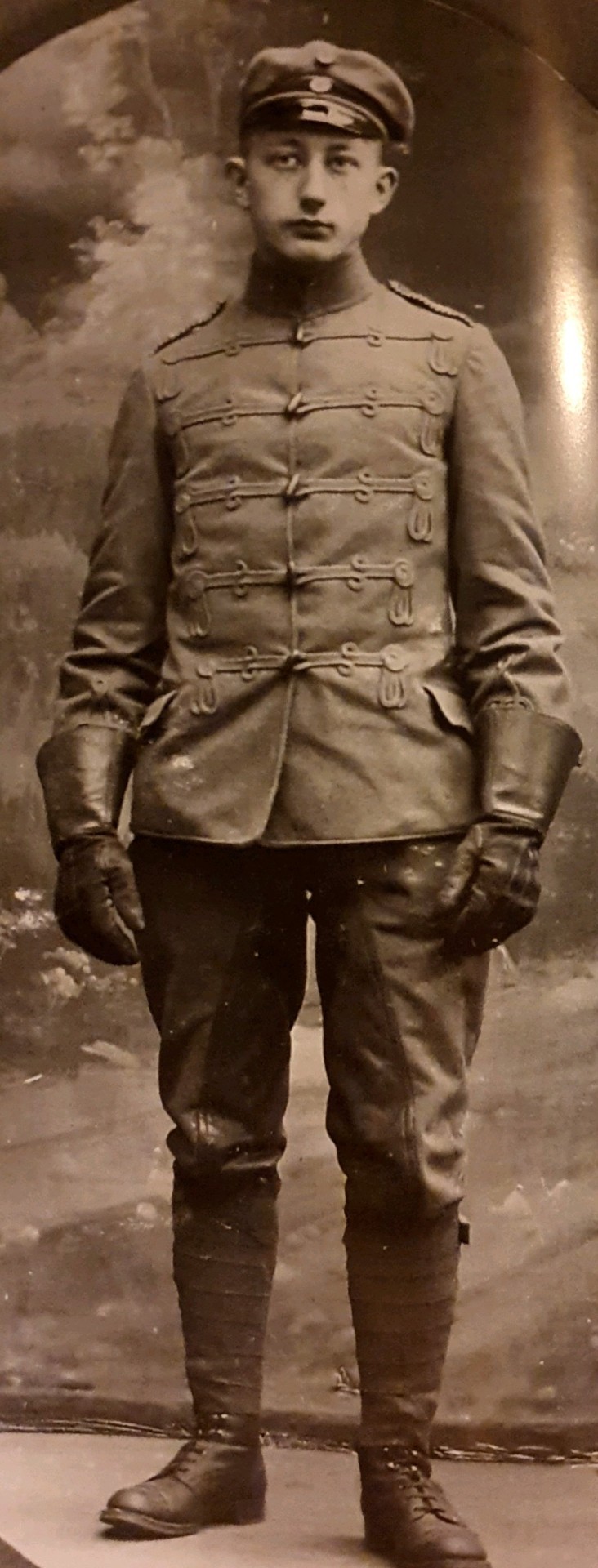
Not being all that enthusiastic about sitting in mud all day, Voss transferred to the Air Service. From September 1915 until February 1916 he trained as a pilot near his hometown. In March, he was posted to Kampfstaffel 20 as an observer. From then on his duty involved flying over the Verdun area, dropping bombs on enemy artillery positions and photographing the area.
After the hell of Verdun, Voss got no reprieve as he was sent to the Somme to fight off the British offensive.
After receiving his pilot badge, Voss transferred to the single-seat pilot’s training school. In November 1916, he was officially posted to the Königliche Preußische Jagdstaffel Nr. 2. Yes, the one of the famed Oswald Boelcke. Another notable member of this Jasta: Manfred von Richthofen. But by November, Boelcke was already dead and morale was low. Boelcke’s successor, Stefan Kirmair, may have chosen Voss, but it is also possible that Boelcke himself mentioned wanting Voss as both were stationed at the Verdun Front at the same time and may have come into contact there. A signed portrait of Boelcke in Voss’s possession hints that they did know each other personally. Voss shot down his first victory one day after arriving at Jasta 2, marking November 1916 as the start of an exceptional career.
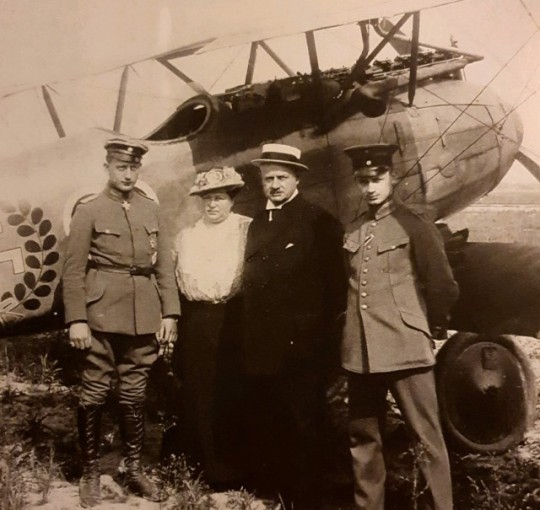
Most people know of the friendship between Werner Voss and Manfred von Richthofen as documented by pictures of them together visiting Voss’s family. This friendship started in Jasta Boelcke with MvR teaching Voss how things were done there. Rumored rivalry between the two talented pilots seems to be pure gossip. Both men may have humorously competed with each other for higher victory scores, but they both shared the same goals. They complimented each other in that MvR was a great leader but no exceptionally great pilot, while Voss was a great pilot but no great leader.
MvR was a guest of the Voss family in Krefeld on multiple occasions, with Richthofen also having permission to use the family's hunting lodge in the Black Forest. Even after Voss’s death, MvR kept contact with the family.

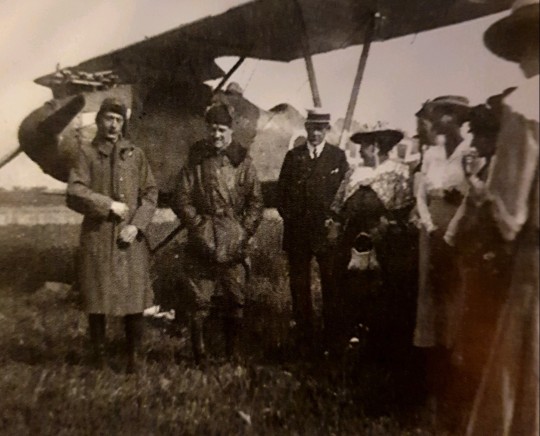
Voss stayed with Jasta 2 during the infamous Bloody April, a time which was indeed very bloody for the men of the British air service. They lost more aircrews during April 1917 than at any other time during the war. By April, Voss had 25 victories under his belt. On April 8th, he finally received the coveted Orden Pour le Mérite, Germany's highest military award. All that even before he turned 20.
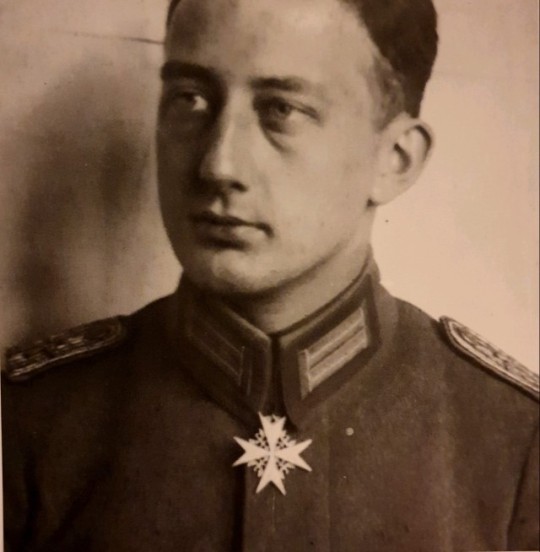
As he was on leave, Voss didn't actually participate all that much during Bloody April. Considering his many victories, it would be interesting to know how many more he would have gotten, had he fought during this time as well.
25 notes
·
View notes
Text

Certes, en tant qu'étudiants, nous sommes naturellement impatients de voir les résultats de nos efforts. Pourtant, nous ne pouvons rien accomplir tant que nous n'avons pas maîtrisé notre impatience.
D'un autre côté, simplement lutter contre l'impatience de manière ordinaire ne sert à rien. Cela ne fait que la renforcer. Nous ne ferions que nous tromper nous-mêmes, et notre impatience enfoncerait ses racines plus profondément dans notre âme.
Ce n'est que si nous nous abandonnons de manière répétée à une pensée particulière, en la faisant entièrement nôtre, que nous pouvons accomplir quoi que ce soit. Cette pensée est : « Je dois faire tout ce que je peux pour l'éducation de mon âme et de mon esprit ; mais j'attendrai calmement jusqu'à ce que les puissances supérieures me jugent digne d'illumination. »
Une fois que cette pensée est devenue si puissante en nous qu'elle fait partie de notre caractère, alors nous sommes sur la bonne voie.
Peu de temps après, ce nouveau trait de caractère appose sa signature extérieure sur nous. Notre regard devient calme, notre œil stable, nos mouvements confiants, nos décisions définitives. Toute nervosité que nous ressentions auparavant disparaît progressivement.
À ce stade, certaines petites « règles » apparemment insignifiantes doivent être observées.
Par exemple, disons que quelqu'un nous offense. Auparavant, avant l'entraînement ésotérique, nous aurions tourné nos sentiments contre l'offenseur. L'irritation et la colère auraient bouillonné en nous.
Cependant, maintenant que nous sommes sur le chemin de la connaissance supérieure, la pensée nous vient immédiatement : « Cette insulte n'altère pas ma véritable valeur. »
Nous faisons alors ce qui doit être fait, calmement et avec détachement plutôt que par colère. Cela ne signifie pas que nous avalons simplement les insultes ; nous devons plutôt répondre avec autant de calme et de confiance aux insultes qui nous sont adressées que si nous agissions au nom de quelqu'un d'autre qui aurait été insulté.
Nous devons toujours garder à l'esprit que l'apprentissage ésotérique ne se produit pas à travers de grands événements extérieurs, mais plutôt à travers des changements intérieurs calmes et subtils dans nos vies de pensée et de sentiment.
Rudolf Steiner, Comment acquérir des connaissances sur les mondes supérieurs
3 notes
·
View notes
Note
i Have to know what wwi au duck hunt is about??
duck hunt is one of the more complicated ones--i wrote it back in college and began rewriting it a year and a half ago?? it's a climactic insane moment where elliot confesses to nol and i wanted to shape it up bc it feels like this the entire way thru

theyre wandering around in the fields nearby the psychiatric hospital nol is a patient at. hes very comfortable in nature with his rifle, looking for things to kill, while eli is worriedly tagging along w an umbrella
nol kills a couple ducks and collects them, making him even more brainlessly content w himself. it starts pouring and nol leads them to a gazebo beside a heavy river w a bunch of canoes
they have this tense, awkward talk abt eating and food, then nol decides he wants to swim bc hes already wet and he's still riding this weird, unthinking high of feeling in his element. elliot's like, no wtf
so nol grabs him and runs across the canoes like a plank bridge until one inevitably shifts and knocks them into the river. eli panics, and nol yanks them back to the shore.
theres a huge physicality to the water eli gets dragged from, the shore pebbles he gets pulled onto, nol's hands on him and nol's body above his to shield him from the rain. this is not making eli feel any better, and hes like 'fml never do that again sir'
the convo becomes 'why do u call me sir. its weird.' / bc i respect u / 'no u dont. theres smth wrong w ur respect.'
so eli just explodes like yeah!! there IS smth wrong w it!! and wrong w me!! and im gonna just spell it out in the most convoluted way bc im frustrated and afraid!!
so nol sits there with a single dead braincell. barely understands any of it. and comes out of the convo with a Sinking Suspicion that being institutionalized for several manic breakdowns in Not the worst thing wrong with him, and perhaps he is in love w this medic thats been bullying him across the somme offensive
eli sits there w a braincell that feels like its being pinned to a torture table. nol tells him to go back to town, but hes like 'mmmm no' bc maybe he'd rather feel like a prey animal abt to be killed by a machisimo madman than be alone. so nol hands him a dead duck like. 'k. ur good at taking bullets out so'
#im rattling my cage wwi au is so good#elliot spitting out strange references to oscar wilde / edward carpenter/ havelock ellis / magnus hirschfeld / karl ulrichs / etc etc:#nol who just spent 20 mins in his head talking to a dead corporal and rubbing the electric burns left on his back from shellshock treatment:#also shoutout to lselle showing up with the AEF and pointing at them like#oh so the ymca dilly and the nervous case are gamahuchers#5 seconds after nol ALREADY threatened to kill him#its a mystery how any of them have survived The Great War this long#bri writes
5 notes
·
View notes
Text
En Argentine, la démocratie et les droits fondamentaux en péril ! Solidarité avec les travailleuses et travailleurs et les syndicats du pays !
Javier Milei, entré en fonction le 10 décembre 2023, déroule déjà sa politique populiste d’extrême-droite, faisant peser de lourds dangers sur la démocratie et sur les droits fondamentaux des citoyens en Argentine, à commencer par ceux des travailleuses et des travailleurs.
Fin décembre, le président Argentin a présenté le Décret de Nécessité d’Urgence (DNU) et la Loi Omnibus, qui s’attaquent à plus de 300 dispositions touchant aux bases des droits individuels et collectifs. Ces mesures remettent en cause les fondements démocratiques du pays, rompant avec la séparation des pouvoirs et violant la Constitution argentine. Ce décret vise également le démantèlement des services publics et de la protection sociale, avec le licenciement de milliers de fonctionnaires argentins déjà à l’œuvre, en instaurant une austérité dévastatrice pour le modèle social argentin et les droits et intérêts des travailleuses et travailleurs en Argentine.
Parallèlement, ce même gouvernement a rapidement publié un protocole, ayant pour objectif la criminalisation de la contestation sociale, en permettant notamment un usage indiscriminé du recours à la répression d’État contre toutes les formes de lutte, en particulier celles des travailleuses et des travailleurs.
Les travailleuses et travailleurs sont de fait en première ligne face à ces réformes, citons entre-autres : la volonté d’éliminer la justice du travail, la remise en cause de la liberté syndicale et d’adhérer ou non à un syndicat, le renforcement des prérogatives des employeurs pour réprimer l’activité syndicale au quotidien, la mise en place d’une période d’essai de 10 mois, l’élimination en pratique du droit de grève et la suppression du droit à l’indemnisation pour licenciement sans cause réelle et sérieuse.
En outre, ces batteries de mesure incluent le démantèlement des normes environnementales et l’abandon de la souveraineté, sur les richesses naturelles et les terres du pays aux desiderata des capitaux internationaux.
La politique de Milei témoigne de la nature profonde de l’extrême-droite, un danger mortel pour le monde du travail, pour les services publics et pour l’environnement, et un mépris des principes démocratiques les plus élémentaires.
Nos organisations syndicales CFDT, CGT, FO, FSU, UNSA et Solidaires expriment leur plus vive inquiétude face à cette offensive contre les acquis de plusieurs décennies de luttes sociales et syndicales en Argentine.
Nous adressons toute notre solidarité aux travailleuses et travailleurs d’Argentine, et notamment aux confédérations syndicales CGT-RA, CTA-T et CTA-A. Nous les soutenons inconditionnellement dans le processus de lutte qu’elles ont engagés pour faire face aux politiques mortifères de Milei et son gouvernement.
En particulier, nous sommes solidaires de l’appel à la grève nationale du 24 janvier initié par les trois centrales syndicales du pays. Elles réclament le respect du fonctionnement démocratique du pays et de sa Constitution ainsi que le retrait de ces lois bafouant un nombre incalculable de droits fondamentaux, à commencer par les conventions de l’OIT que le pays a ratifiées.
Nos organisations syndicales CFDT, CGT, FO, FSU, UNSA et Solidaires appellent à se rassembler le mercredi 24 janvier à 18h00 devant l’ambassade d’Argentine pour témoigner de notre solidarité avec les travailleuses et travailleurs, et les syndicats, en lutte pour défendre leurs droits et la démocratie.
Rassemblement de solidarité devant l’ambassade d’Argentine le 24 janvier à 18h00 à l’angle de la rue Cimarosa et de l’avenue Kleber, 75016, Paris. Metro 6 : Boissière

#argentina#france#Merci beaucoup#chikis el comunicado original de la intersindical francesa#no se vuelve a decir francia segundo nunca más
4 notes
·
View notes
Text





Automne 1914, Saint-Jean-sur-Richelieu, Canada (3/22)
Nos retrouvailles furent brèves, car le 20 octobre, quand j’appris la formation d’une unité canadienne-française, je décidai de m’engager. C’est ainsi que quatre hommes de l’île et moi-même sommes partis à Montréal rejoindre le 22e Bataillon - que les anglophones surnomment déjà « Vandoo ».
[Transcription]
Eugénie LeBris : Il vient tout juste de pleuvoir. Si vous vous asseyez maintenant, vous allez être trempé comme une soupe !
Jules LeBris : Maintenant que je peux rester lire dehors sans risquer l’insolation, je compte bien en profiter !
Jules LeBris : Voyons ce que dit Le Devoir… « Un premier bataillon canadien de 32 000 hommes prend le bateau pour aller se battre en Europe »… « Offensive allemande à Yser »… Oh !! « Le 22e bataillon canadien-français fait son entrée officielle au sein de l’institution militaire canadienne. La nouvelle unité canadienne-française connait un franc succès au sein de la population francophone » ! Génie, vous entendez ça ?
Jules LeBris : Il faut que j’aille m’engager au plus sacrant !
Eugénie LeBris : Vous engager ? Mais vous me niaisez ! Vous venez à peine de rentrer !
Jules LeBris : Ma patrie a besoin de moi !
Eugénie LeBris : Vous êtes ben trop vieux. Que vais-je devenir si vous vous faites tuer ? Et les enfants ?
Jules LeBris : J’ai 41 ans, il me reste quatre années entières de service, et la guerre sera terminée bien avant.
#ts3#simblr#legacy challenge#history challenge#decades challenge#lebris#lebrisgen3ter#Jules Le Bris#Eugénie Bernard#Lucien Le Bris#Louise Le Bris II#Agathon Le Bris#Marie Le Bris III
8 notes
·
View notes
Text
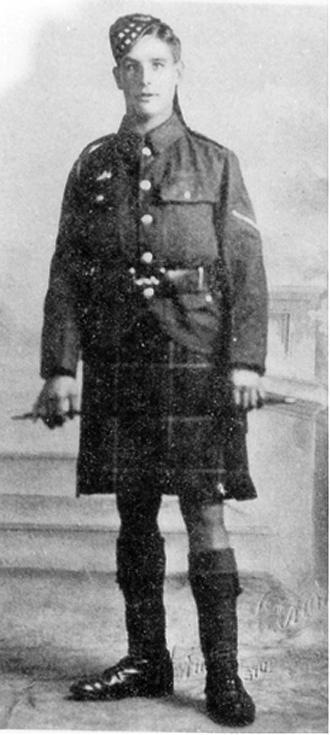
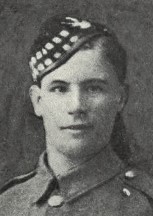
On 20th July 1918 near Marfaux, France, Sergeant John Meikle died, he was just 19.
Sergeant Meikle joined the 2/4th Seaforths on the 8th February, 1915, when barely 19 years. He was trained at Bedford, Fort George, and Blair Atholl, being one of the hardy band to cross the Grampians on the long trek between the Fort and the Blair. He went to France on July 30th, 1916, and although wounded on two or three occasions, never seriously, had only been home on furlough, his last leave being in November, 1917, shortly after the battle of Cambrai. He had a high reputation in the battalion throughout, and it was felt that when he got the Military Medal for gallantry in action on September 20, 1917, he had won it well. Sergt Mekle received a gold watch from the people of Nitshill when home on furlough, and was promoted sergeant on returning to France
On 20th July 1918 near Marfaux, France, Sergeant John Meikle died, he was just 19.
John Meikle was one of the many First World War recruits that were so anxious to join up that they lied about their age.
He was just 16 years when he volunteered to go to war by pretending to be 18, the lowest official age for enlistment. One historian has estimated that as many as 250,000 "boy soldiers" under the age of 18 signed up to fight in the Great War.
Three years after he enlisted, Meikle died aged 19 and is thought to be one of the youngest-ever recipients of the Victoria Cross. He is also the only Scottish railway employee to have received this award for valour. Of the 628 crosses awarded during the war, only 25 went to men under 20.
Like so many young men at the start of the war, Meikle was motivated by patriotism to "do his bit" for his country. He attempted to enlist after war broke out in 1914 but was rejected due to his youthful appearance and small stature.
Eventually he was accepted by the Seaforth Highlanders on 8 th February 1915 at Maryhill Barracks. He lied about his age saying he was 18, when in fact he was 16 years and five months old. But even at his pretend age of 18, he had to wait a further year to go to France, as a soldier had to be 19 to fight overseas.
Meikle's personal military service record, along with many others, was destroyed in an air raid during the Second World War. But it is know that on July 30th, 1916, Meikle, who had by now trained as a Lewis (machine-) gunner, was sent to France. He was transferred to the 1/4th Seaforth (Ross Highland) Battalion, fighting in the Battle of the Somme and subsequently rising quickly through the ranks.
He was injured in the 3rd Battle of Ypres in 1917, during which he was awarded the Military Medal for his actions near Langmarch. He was sent home to Glasgow to recover from his injuries.
While in Nitshill in November 1917, he was presented with a gold watch on behalf of his fellow villagers in the local public hall. The watch engraved with his initials remains a treasured family heirloom. When Meikle returned to France, he had been promoted to sergeant.
The Second Battle of the Marne was the turning point for the Allies in the War, and became known as the last great German offensive. By 20 July 1918, Meikle and his unit (No 2 Company, 4th Battalion), were with the 51st Highland Division in the French Aisne-Marne Sector, and would defend the Ardre Valley.
Meikle's comrade, Company Sergeant Major G W Sturrah, (who was only 23 years old himself), in a letter to Meikle's mother Annie, wrote: "It is with the deepest regret that I write to you to inform you of your dear son 200854 Sgt Meikle, J, of his death, (killed in action) on the 20th July. We were on this day attacking a strong enemy position, and your dear lad behaved as gallantly as ever Britisher did. He single handed knocked out an enemy machine gun post and its crew. Knocking out with a walking stick he always used to carry and was afterwards rushing another similar post when he was killed by Machine Gun fire. His death was instantaneous."
After his death, his mother Annie donated accumulated funds from her son's VC pension and soldiers pay to two local churches. The family did not attend the official presentation of John's VC at Buckingham Palace, as they were unable to afford the associated expense of new clothes and accommodation in London. Instead they chose to receive the decoration during a local parade at Maryhill Barracks on 28 October 1918.
10 notes
·
View notes
Text
Plus de citations ou points clés du merveilleux livre de Thucydide... dont le titre est "Histoire de la guerre du Péloponnèse"
▪ Ce n’est pas l’oppresseur qui est le vrai coupable, c’est celui qui peut faire cesser l’oppression et qui la dissimule, surtout lorsqu’il s’enorgueillit de sa vertu, et se donne pour le libérateur.
▪ On mérite des éloges quand on est moins injuste qu’on n’aurait le pouvoir de l’être.
▪ Il ne faut pas croire que l’homme diffère beaucoup de l’homme ; mais que celui-là doit l’emporter, qui a reçu de son éducation le courage de lutter contre la nécessité même.
▪︎Le meilleur moyen de vivre en sécurité c'est d'éviter autant que possible d'avoir à se repentir de ses complaisances envers ses ennemis.
▪ N’abandonnons pas ces maximes que nous ont laissées nos pères, et que nous nous sommes bien trouvés de suivre. Follement empressés, ne décidons pas, dans la courte durée d’un jour, du sort de tant d’hommes, de tant de richesses, de tant de villes, enfin de notre gloire ; mais donnons-nous le temps de délibérer.
▪ Il est dans le caractère que vous ont transmis vos ancêtres d’acquérir des vertus au milieu des fatigues : ne changez point de mœurs, quoique vous jouissiez aujourd’hui d’un peu plus de fortune et de puissance. Il n’est pas juste de perdre par la richesse ce qu’on a gagné par la pauvreté.
▪ Il n’est honteux à personne d’avouer qu’il est pauvre ; mais ne pas chasser la pauvreté par le travail, voilà ce qui est honteux.
▪︎Du fait que l'État chez nous est administré dans l'intérêt de la masse et non d'une minorité, notre régime a pris le nom de démocratie.
▪︎Un homme qui ne se mêle pas de politique mérite de passer, non pour un citoyen paisible, mais pour un citoyen inutile.
▪ La tombe des grands hommes est l’univers entier : elle ne se fait pas remarquer par quelques inscriptions gravées sur des colonnes, dans une sépulture privée, mais jusque dans les contrées étrangères, et sans inscription leur mémoire est bien mieux dans les esprits que sur des monuments fastueux.
▪ La douleur n’est pas dans l’absence d’un bien qu’on n’a point éprouvé, mais dans la privation de celui dont on avait contracté l’habitude.
▪ Où les plus belles récompenses sont offertes à la vertu, là se trouvent les meilleurs citoyens.
▪ Il faut supporter avec résignation les maux que nous envoient les dieux, avec courage ceux que nous font les ennemis.
▪ Connaissez ce qui sera beau pour la postérité ; ce qui, pour le présent, n’a rien de honteux : tels doivent être les deux objets de votre zèle.
▪ L’ignorance modeste vaut mieux que l’habileté présomptueuse, et les hommes les plus ordinaires gouvernent généralement mieux les états que les plus habiles.
▪ La colère de l’offensé contre l’offenseur finit par s’émousser, mais, quand la vengeance suit l’injure de près, elle en est une représaille, et lui inflige une punition plus rigoureuse.
▪ Il est naturel à l’homme de mépriser ceux qui le caressent, et de respecter ceux qui ne lui cèdent pas.
▪ Le bon citoyen ne doit pas effrayer ceux qui défendent une opinion contraire à la sienne ; mais en leur laissant la faculté de parler, il doit montrer lui-même, par la parole, que la raison est de son côté.
▪ Il est de la nature de l’homme de faire des fautes et dans les affaires privées et dans les affaires publiques ; c’est ce qu’aucune loi ne sera capable d’empêcher.
▪ La misère donne une audace qu’inspire la nécessité ; la richesse conduit à l’ambition par l’insolence et l’orgueil ; dans toute situation, les passions des hommes les portent toujours à se hasarder, tous entraînés par quelque penchant invincible.
▪ Je crois que, pour maintenir votre domination, il vous est bien plus avantageux de supporter de bonne grâce une offense, que de punir justement ceux que vous devez épargner.
▪ Il est moins honteux de ne pas reconnaître un bienfait, que de marquer à ses bienfaiteurs, par une injustice, la reconnaissance qu’on leur doit justement.
▪ Ceux qui conduisent pèchent plus que ceux qui suivent.
▪ C’est quand on souffre injustement qu’on est digne de pitié.
▪ N’écoutez pas un faux point d’honneur ; il perd souvent les hommes au milieu de périls manifestes, qu’ils doivent rougir de n’avoir pas évités.
▪ Considérons que pour accroître nos avantages, il faut les aller chercher.
▪ S’ils en ont la volonté, ils en ont aussi mieux que personne le pouvoir.
▪ Sachez que l’absolue nécessité vous impose d’avoir du courage, parce qu’il n’est près de vous aucun asile où vous puissiee vous sauver si vous manquez de vigueur.
▪︎ L'épaisseur d'une muraille compte moins que la volonté de la franchir.
▪ Ce sont les hommes qui constituent les villes, et non des murailles et des vaisseaux vides.
#lestoïcisme
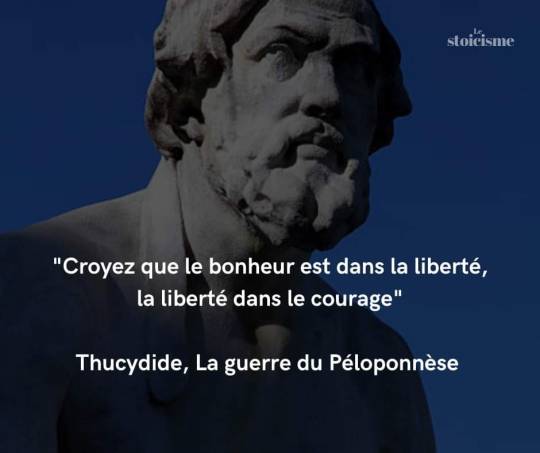
10 notes
·
View notes
Text

Aerial photograph of a British gas attack from Carnoy to Montauban, shortly before the Somme offensive. Late June, 1916.
14 notes
·
View notes
Text

General Sir William Riddell Birdwood addressing soldiers of the 2nd Australian Infantry Brigade in Vadencourt Wood after their first tour of duty at Pozieres. Between 23 July and early September 1916, as part of the Somme Offensive, the 1st, 2nd and 4th Divisions between them launched 19 attacks on German positions in and around the ruins of Pozieres.
8 notes
·
View notes